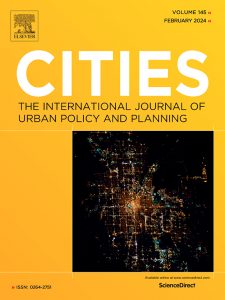2024 World Refugee Day Western New York
Saturday, June 22, 2024
Front Park, Buffalo, NY
Contact Fardowsa Nor or Najma Farah at worldrefugeeday716@gmail.com or at 315-741-5507
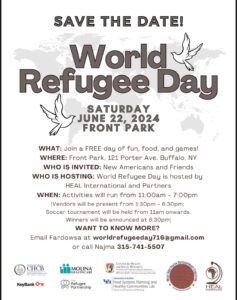 Worldwide about 114 million people are forcibly displaced from their homes due to persecution, human rights violations, and acute and protracted violence (UNHCR, 2023). Our city and region is fortunate to be a refuge for resettled New Americans. In 2023, 1312 individuals were resettled in Erie County. Resettled individuals in Buffalo come from a variety of different places including Afghanistan, Columbia, Guatemala, Myanmar, Somalia, Syria, The Democratic Republic of Congo, and Ukraine, among others.
Worldwide about 114 million people are forcibly displaced from their homes due to persecution, human rights violations, and acute and protracted violence (UNHCR, 2023). Our city and region is fortunate to be a refuge for resettled New Americans. In 2023, 1312 individuals were resettled in Erie County. Resettled individuals in Buffalo come from a variety of different places including Afghanistan, Columbia, Guatemala, Myanmar, Somalia, Syria, The Democratic Republic of Congo, and Ukraine, among others.
In honor of resettled New Americans, our city and region will celebrate the 2024 World Refugee Day (WRD) in WNY on Saturday June 22, 2024. “Building on past WRD celebrations, the day is an opportunity to honor and celebrate resettled individuals and families whose diverse cultures enrich life in Buffalo. This is a day to celebrate courage and healing of people in the face of extraordinarily difficult circumstances,” says Ali Khadum, founder of WRD Western New York. Importantly, the day is designed to promote conversations and support strategies for improved health and wellbeing of New Americans in Western New York.
Co-organized by HEAL International and its partners, 2024 World Refugee Day festivities will take place at Front Park in Buffalo, NY on June 22, 2024, and all are invited. The program includes child- and family-friendly entertainment including a soccer tournament and theme park. Service providers and educational organizations will provide enrichment activities. An area will be set aside for families to have picnics, and a variety of food from different regions of the world will be available for purchase.
Creating a celebratory space for people of all backgrounds is important more than ever. Expressions of violence against particular groups of people persist globally and locally including in Ukraine, Congo, Gaza, Sudan where people are actively being displaced from their homes (UNHCR and UNRWA). Locally, too, Buffalo witnessed tragic racist violence against Black people on May 14th, 2022. Condemning all expressions of violence, displacement, and hatred toward people, the 2024 World Refugee Day of Western New York celebrates the courage of all refugees, and hopes for a peaceful and free world for all people. “World Refugee Day in Western New York recognizes all the ways in which New Americans enrich our region, and all the ways in which our community welcomes New American,” said Abdirahman Farah, one of the lead organizers.
A limited number of spots are available for vendors and service providers to join the World Refugee Day festivities. Organizers are also seeking volunteers for the day of the event (Vendors/service providers and volunteers must sign up by June 18; volunteer orientation will be on June 20, 5:00 PM).
Activities
11:00 AM-6:30 PM Soccer tournament
1:30 PM -6:30 PM Food vendors, service providers, entertainment, and educational services will be present
1:45 PM -2:00 PM Welcome
6:30 PM -7:00 PM Closing
Notes for attendees: We encourage attendees to carpool, ride their bicycles, or walk to the event to cut down on traffic and ensure an environmentally-friendly event. Cars will not be allowed in the Front Park parking lot. We also encourage attendees to bring their own water to cut down on plastic waste.
Sponsors: The 2024 World Refugee Day is made possible through the generous funding from Community Health Center of Buffalo, Community for Global Health Equity, City of Buffalo Council Member David Rivera, Erie County Legislator April Baskin, Key Bank, Molina HealthCare, The Refugee Partnership, and The West Side Youth Development Coalition.
Planning Partners: Helping Everyone Achieve Livelihood (HEAL) International, Center for Health and Social Research Buffalo State College, Community Health Center of Buffalo, The Refugee Partnership, University at Buffalo Food Systems Planning and Healthy Communities Lab, West Side Youth Development Coalition, and others.
Questions? Attendees, prospective vendors, prospective volunteers and media can contact Fardowsa Nor or Najma Farah at worldrefugeeday716@gmail.com or at 315-741-5507
- UN World Refugee Day is on June 20. In Western New York, the community is hosting celebrations on the Saturday following UN WRD on June 22, 2024.
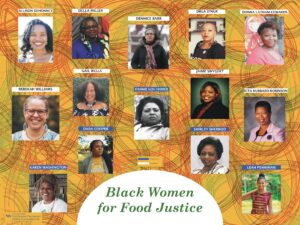 Black women have used, controlled, and shaped food spaces to their families’ and communities’ advantage for hundreds of years in the United States. From the first enslaved women brought to New Amsterdam in 1619 to women today, powerful Black women have used food as a lever for social transformation. Black women’s food-related agency has spanned from the kitchen table to policy circles, though this agency is often overlooked in research, policy, and popular discourse. This Juneteenth we reflect on the historic contributions and present-day work of Black women to advance food justice in East Buffalo and beyond. Read the full article here
Black women have used, controlled, and shaped food spaces to their families’ and communities’ advantage for hundreds of years in the United States. From the first enslaved women brought to New Amsterdam in 1619 to women today, powerful Black women have used food as a lever for social transformation. Black women’s food-related agency has spanned from the kitchen table to policy circles, though this agency is often overlooked in research, policy, and popular discourse. This Juneteenth we reflect on the historic contributions and present-day work of Black women to advance food justice in East Buffalo and beyond. Read the full article here Black women have used, controlled, and shaped food spaces to their families’ and communities’ advantage for hundreds of years in the United States. From the first enslaved women brought to New Amsterdam in 1619 to women today, powerful Black women have used food as a lever for social transformation. Black women’s food-related agency has spanned from the kitchen table to policy circles, though this agency is often overlooked in research, policy, and popular discourse. This Juneteenth we reflect on the historic contributions and present-day work of Black women to advance food justice in East Buffalo and beyond. Read the full article here
Black women have used, controlled, and shaped food spaces to their families’ and communities’ advantage for hundreds of years in the United States. From the first enslaved women brought to New Amsterdam in 1619 to women today, powerful Black women have used food as a lever for social transformation. Black women’s food-related agency has spanned from the kitchen table to policy circles, though this agency is often overlooked in research, policy, and popular discourse. This Juneteenth we reflect on the historic contributions and present-day work of Black women to advance food justice in East Buffalo and beyond. Read the full article here Worldwide about 114 million people are forcibly displaced from their homes due to persecution, human rights violations, and acute and protracted violence (UNHCR, 2023). Our city and region is fortunate to be a refuge for resettled New Americans. In 2023, 1312 individuals were resettled in Erie County. Resettled individuals in Buffalo come from a variety of different places including Afghanistan, Columbia, Guatemala, Myanmar, Somalia, Syria, The Democratic Republic of Congo, and Ukraine, among others.
Worldwide about 114 million people are forcibly displaced from their homes due to persecution, human rights violations, and acute and protracted violence (UNHCR, 2023). Our city and region is fortunate to be a refuge for resettled New Americans. In 2023, 1312 individuals were resettled in Erie County. Resettled individuals in Buffalo come from a variety of different places including Afghanistan, Columbia, Guatemala, Myanmar, Somalia, Syria, The Democratic Republic of Congo, and Ukraine, among others.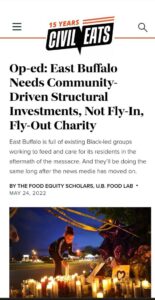 Revisiting the Civil Eats Op-ed: Addressing food apartheid requires sustained structural investments, not charity
Revisiting the Civil Eats Op-ed: Addressing food apartheid requires sustained structural investments, not charity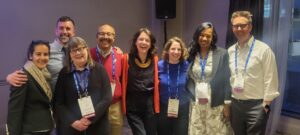 Reunion for equity! The extended Food Lab family of team members, alums, and partners (including American Planning Association (APA) Food Division, University of Wisconsin Madison, University of Washington, Urban Fruits & Veggies) were at the 2024 American Planning Conference in Minneapolis, arguing for centering equity in planning for urban agriculture. The events built on and celebrated the legacy of Jerry Kaufman, the father of food systems planning.
Reunion for equity! The extended Food Lab family of team members, alums, and partners (including American Planning Association (APA) Food Division, University of Wisconsin Madison, University of Washington, Urban Fruits & Veggies) were at the 2024 American Planning Conference in Minneapolis, arguing for centering equity in planning for urban agriculture. The events built on and celebrated the legacy of Jerry Kaufman, the father of food systems planning.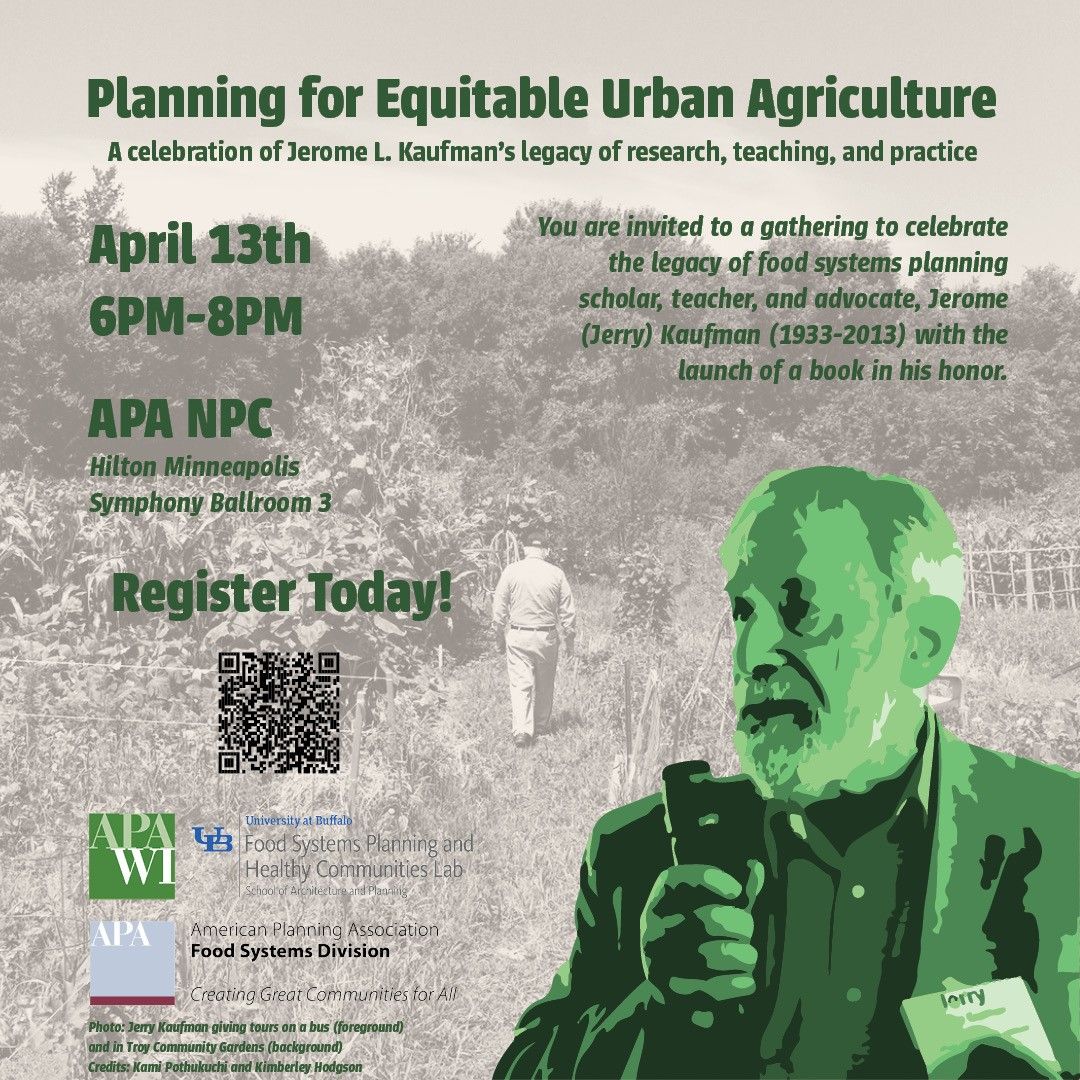
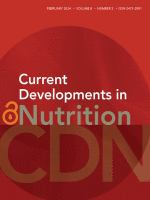 In this article in ELSEVIER, the authors describe how the use of social infrastructures impacts food security and nutrition equity in a majority Black and urban community in the United States.
In this article in ELSEVIER, the authors describe how the use of social infrastructures impacts food security and nutrition equity in a majority Black and urban community in the United States.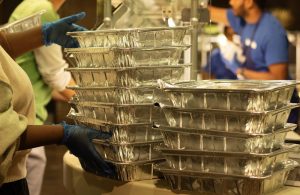
 February is Black History Month, an annual celebration of accomplishments, contributions and achievements by African Americans and a time to recognize their role in U.S. history
February is Black History Month, an annual celebration of accomplishments, contributions and achievements by African Americans and a time to recognize their role in U.S. history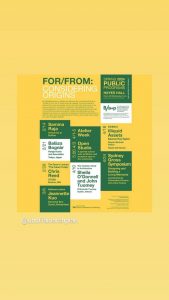 Dr. Samina Raja, founder and director of the UB Food Lab, will deliver a lecture, “Dis)entangling research(ers) from/in place,”
Dr. Samina Raja, founder and director of the UB Food Lab, will deliver a lecture, “Dis)entangling research(ers) from/in place,”